Hibiscus Benefits For Hair: 5 Key Ways To Strengthen Strands
Simple and easy ways to incorporate hibiscus into your hair care routine.
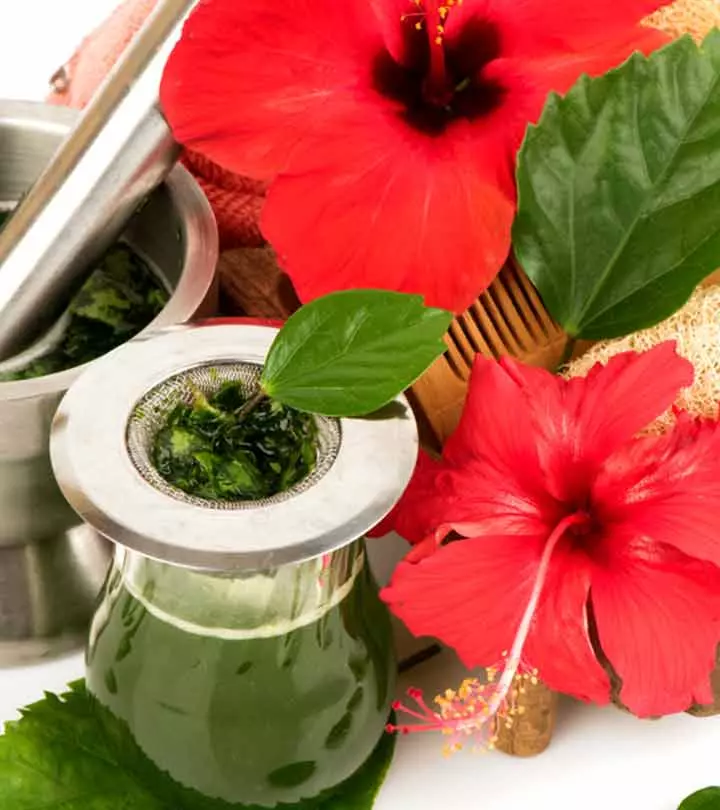
Image: Shutterstock
Cheers if you have been drinking Hibiscus tea all your life and have never realized how good this flower is for your hair. The benefits of hibiscus for your hair are so many that it deserves much more credit as a herb. The flower is rich in vitamins and antioxidants, making it ideal for rejuvenating the hair. Studies suggest that this botanical flower has the potential to stimulate inactive hair follicles in bald patches (1). In this article, we will look at how this flower helps reduce hair fall, induce re-growth, and prevent premature graying of your hair. Keep scrolling.
 Trivia
TriviaIn This Article
Benefits Of Hibiscus For Hair
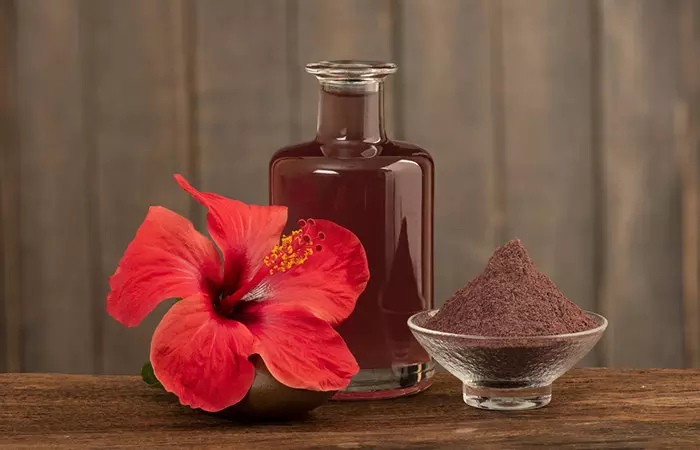
1. Stimulates Hair Growth
Hibiscus-infused oil can help boost hair growth. It is rich in vitamin C, the deficiency of which is known to cause hair loss (2). The flower stimulates hair regrowth from dormant follicles and bald patches. One study conducted on rats found that the leaf and flower extracts of hibiscus promote hair growth. A 2003 study published in the Journal of Ethnopharmacology investigated the hair growth potential of Hibiscus rosa-sinensis using in vivo and in vitro methods. Researchers applied a 1% petroleum ether extract of hibiscus leaves and flowers to the shaved skin of albino rats for 30 days and monitored hair length and follicle cycle phases. They also cultured isolated hair follicles from newborn rats with the extract. Results showed that hibiscus leaf extract was more effective than flower extract in promoting hair growth and increasing the anagen (growth) phase of hair follicles. The study suggests that hibiscus leaves may have strong hair-regenerating properties (1). However, most studies in this regard have been performed on animals. More research on humans is required to prove this benefit.
2. Conditions The Hair
Hibiscus seeds are rich in amino acids that nourish your hair, strengthen your roots, and keep your locks lustrous and healthy (3). Anecdotal evidence suggests that the hibiscus acts as a natural conditioner due to the presence of high mucilage. Also, the ultra-emollient property of hibiscus is said to restore the elasticity of the hair and condition your hair (4).
3. Helps Prevents Baldness
Hibiscus helps increase hair thickness and reduce hair loss
(4). Also, the use of hibiscus is said to be as effective as the medicines that are used for the treatment of baldness.
4. Treats Dandruff
Hibiscus acts like an astringent and reduces the oil secretion by the sebaceous glands (5). With its antimicrobial properties, hibiscus also curbs the growth of dandruff-causing fungus on the scalp and prevents the recurrence of dandruff (6).

5. Prevents Premature Graying
The natural pigments, antioxidants, and vitamins present in hibiscus are said to help in producing melanin (the natural coloring pigment in our body). Hibiscus has been used as a natural dye to cover gray hair traditionally. It helps prevent premature graying of hair and is a good hair conditioner (4).
 Quick Tip
Quick TipSo, how do you use hibiscus to reap its benefits? Find out in the next section!
Key Takeaways
- Frequent use of hibiscus helps reduce hair fall, stimulate hair regrowth, and prevents premature hair graying.
- You can include hibiscus oil, masks, shampoo, and conditioner in your hair care routine.
- While hibiscus comes in many different colors, the red variety is the most suitable for hair care and nourishment.
How To Use Hibiscus For Hair
1. Hibiscus Oil For Nourishment
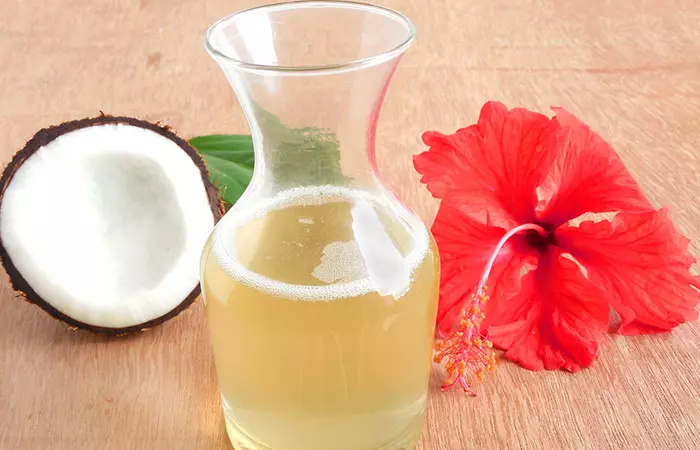
Hibiscus-infused oil helps rejuvenate the scalp and promote hair growth. Coconut oil penetrates deep into the hair shaft, supplying it with nourishment (7). The oil massage also helps improve blood circulation and increases hair thickness (8).
You Will Need
- 8 hibiscus flowers
- 8 hibiscus leaves
- 1 cup of coconut oil
Process
- Wash the hibiscus flowers and leaves and then grind them into a fine paste.
- Heat up one cup of coconut oil in a saucepan and add the hibiscus paste to it. Continue heating the mixture for a couple of minutes.
- Cover the pan with a lid and turn off the flame. Set the pan aside for the oil to cool.
- Once the oil has cooled, take 2-3 tablespoons to use and store the rest in a jar or bottle.
- Massage the oil into your scalp with your fingertips. Work it down to the tips of your hair.
- Once all of your hair is covered, massage your scalp for an additional 10 minutes. Leave the oil in your hair for 30 minutes.
- Wash the oil out with a mild shampoo.
How Often?
3 times a week.
2. Hibiscus And Yogurt Hair Mask For Stronger Hair
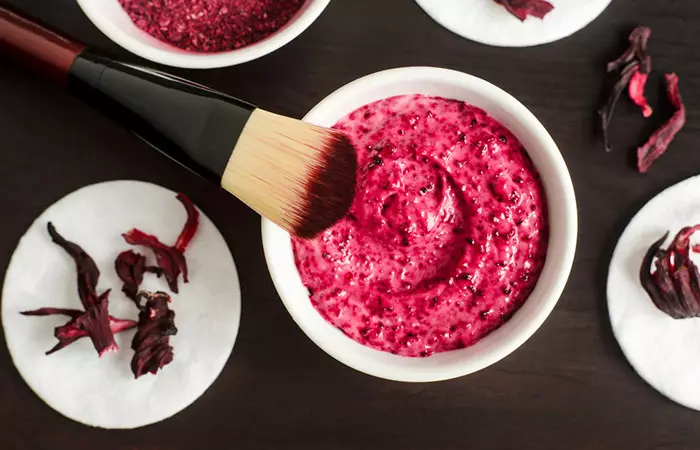
This plant-based hair mask is claimed to help soften and strengthen your tresses. It also makes your hair manageable and provides hair nourishment.
You Will Need
- 1 hibiscus flower
- 3-4 hibiscus leaves
- 4 tablespoons yogurt
Process
- Grind the hibiscus flower along with the leaves into a fine paste.
- Mix the paste with the yogurt until you get a smooth consistency.
- Apply this hair mask to your scalp and hair and leave it on for about an hour.
- Wash the mask out of your hair with lukewarm water and shampoo.
How Often?
1-2 times a week.
Note: Alternatively, you can use hibiscus powder for hair if you can’t get your hands on fresh flowers.
3. Hibiscus Hair Pack For Preventing Dandruff
Fenugreek is a popular remedy for dandruff (9). It also exhibited hair growth-promoting effects in mice in a research study. A 2017 study in the Pakistan Journal of Zoology examined the hair growth-promoting effects of Trigonella foenum-graecum (fenugreek) leaf extracts using an alopecia mouse model. The researchers tested various solvents, including petroleum ether, chloroform, methanol, ethanol, and distilled water. They found that ethanol (5% and 10%) and petroleum ether (5%) extracts significantly enhanced hair growth compared to 5% minoxidil, a standard treatment. While ethanol extracts showed similar effects to minoxidil in hair diameter, they outperformed it in promoting hair length, suggesting a strong potential for hair regrowth (10). Hence, it not only relieves scalp issues but also contributes to hair growth.
You Will Need
- A bunch of hibiscus leaves
- 1 tablespoon fenugreek seeds
- 1/4 cup buttermilk
Process
- Soak the fenugreek seeds overnight in water.
- The next morning, grind the seeds and the hibiscus leaves into a fine paste and mix the buttermilk into it.
- Apply this mixture to your scalp and hair and leave it on for an hour.
- Wash it off with a mild shampoo.
How Often?
Once a week.
4. Hibiscus Hair Pack With Henna For Dandruff Treatment
This hair pack conditions your hair. It not only moisturizes your hair but also eliminates dandruff and is a natural hair conditioner (11).
You Will Need
- A handful of hibiscus flowers
- A handful of hibiscus leaves
- A handful of henna leaves
- 1/2 lemon
Process
- Grind the henna leaves and the hibiscus flowers and leaves together. Add the juice from half a lemon to this mixture.
- Mix well and apply this paste to your scalp and hair. Leave it on for an hour.
- Wash it off with a mild shampoo.
How Often?
Once in two weeks.
5. Hibiscus And Amla Hair Mask For Hair Growth
Amla helps stimulate hair growth (12). It also strengthens your hair and enriches hair pigmentation (13).
You Will Need
- 3 tablespoons crushed hibiscus flowers and leaves
- 3 tablespoons amla powder
Process
- Mix the ingredients to form a paste. You may add some water to get a smooth consistency.
- Apply the amla-hibiscus mixture to your scalp and hair.
- Once all of your hair is covered, leave the mask on for 40 minutes.
- Rinse it out with a mild shampoo.
How Often?
2 times a week.
6. Hibiscus Shampoo For Gentle Cleansing
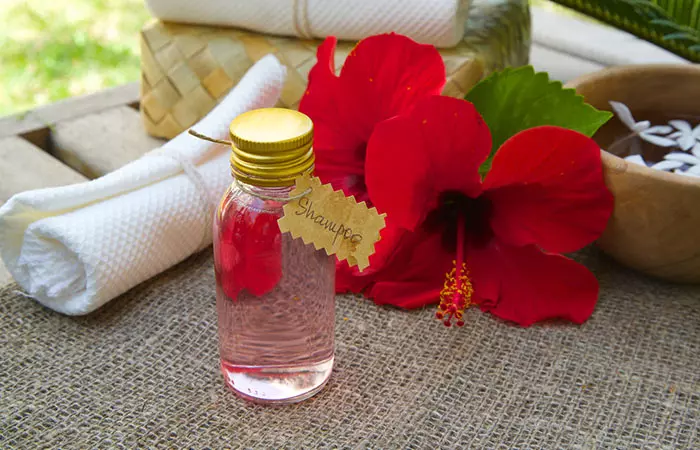
As hibiscus is an excellent ingredient for scalp health, it can also be used as a herbal remedy to wash your hair. The leaves of this flower produce a slight lather, which cleanses the hair without stripping away its natural oils.
You Will Need
- 15 hibiscus leaves
- 5 hibiscus flowers
- 1 cup water
- 1 tablespoon gram flour
Process
- Boil the hibiscus flowers and leaves in a cup of water for 5 minutes. Set it aside to cool.
- Once the mixture has cooled, add the gram flour.
- Wash your hair by replacing your regular shampoo with this mixture.
How Often?
3 times a week.
7. Hibiscus Conditioning Treatment
The conditioning properties of hibiscus soften the hair and make it more manageable, while the amino acids in it nourish the hair follicles and promote hair growth.
You Will Need
- 8 hibiscus flowers
- Water
Process
- Crush the hibiscus flowers and add sufficient water to get a fine, consistent paste.
- Apply this paste on your scalp and hair and wait for an hour.
- Rinse the hibiscus out of your hair with lukewarm water.
How Often?
2 times a week.
8. Coconut Milk With Hibiscus For Split Ends
This pack has excellent conditioning properties, making it perfect for dry hair. It battles dryness, repairs brittle hair, and prevents breakage and splitting. Coconut and its extract can reduce split ends (14).
You Will Need
- 2 tablespoons crushed hibiscus petals
- 2 tablespoons coconut milk
- 2 tablespoons honey
- 2 tablespoons yogurt
- 4 tablespoons aloe vera gel
Process
- Mix the ingredients to get a thick, consistent paste.
- Apply the paste to your scalp and hair and leave it on for 30 minutes.
- Wash the pack out with lukewarm water.
How Often?
Once a week.
9. Ginger And Hibiscus Leaves For Hair Regrowth
Ginger and hibiscus are both amazing hair growth ingredients. When massaged into the scalp, they have the ability to stimulate hair growth from dormant follicles. A 2019 study published in the International Journal of Research in Pharmaceutical Sciences investigated the hair growth-promoting potential of Zingiber officinale (ginger) through herbal gel formulations. The researchers obtained extracts from powdered ginger using alcohol-water (1:1), water, and alcohol, followed by phytochemical and antifungal analyses. They then developed gels containing 5% ginger extract and 5% minoxidil (a standard treatment) and evaluated for pH, viscosity, spreadability, stability, skin irritation, and in vivo hair growth activity. The results were promising- the hydroalcoholic extract-based gel (F1) exhibited optimal properties and increased hair strand length to 28mm, closely matching minoxidil’s 25mm. This study underscores the potential of hydroalcoholic ginger extract as a promising natural alternative for hair growth enhancement (15).
You Will Need
- 3 tablespoons ginger juice
- 2 tablespoons crushed hibiscus flowers
Process
- Combine the ingredients in a bowl until you get a smooth consistency.
- Working in sections, massage the solution into your scalp and then work it down to the tips of your hair.
- Once all of your hair is covered, wait for 20 minutes.
- Wash your hair with lukewarm water.
How Often?
2 times a week.
10. Hibiscus And Egg for Hair Growth
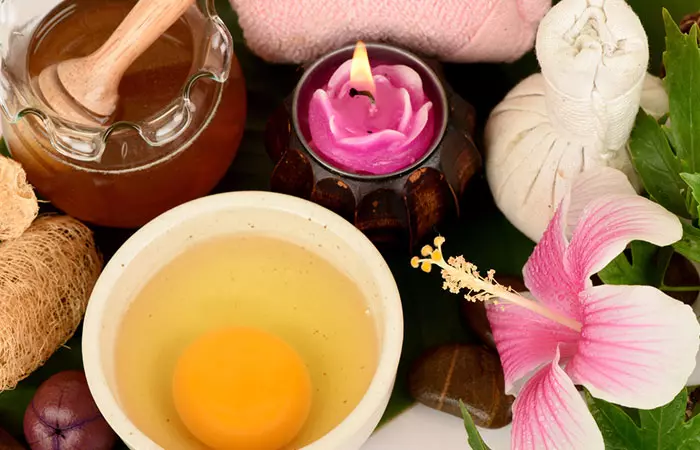
This hair pack is enriched with proteins (16). It works well to control oiliness and hair fall. If you have oily hair, this natural hair treatment may help balance your scalps pH levels and encourage hair growth.
You Will Need
- 2 egg whites
- 3 tablespoons crushed hibiscus flower
Process
- Mix the ingredients in a bowl until you get a consistent paste.
- Apply this paste to your hair until all of it is covered.
- Wait for 20 minutes with the hibiscus-egg pack in your hair, then rinse it out with a mild shampoo.
How Often?
Once a week.
11. Neem Leaves And Hibiscus For Hair Growth
Neem can help treat dandruff (17). It is also said to promote hair strength and aid hair growth, though there is no scientific evidence to back these claims.
You Will Need
- 10 neem leaves
- A handful of hibiscus leaves
- 1/4 cup water
Process
- Grind the neem leaves with water and then sieve the juice.
- Grind the hibiscus leaves and mix them with the neem juice to create a thick paste.
- Apply this mixture to your scalp and hair and leave it on for 20 minutes.
- Wash your hair with lukewarm water.
How Often?
2 times a week.
12. Hibiscus And Olive Oil For Nourishing Hair
Olive oil contains oleic acid that inhibits the activity of 5-alpha reductase, an enzyme that can cause hair loss (18). Thus, this hair mask can help prevent hair loss. It also imparts hair shine.
You Will Need
- 1 teaspoon olive oil
- 5 hibiscus leaves
- 5 hibiscus flowers
Process
- Grind the leaves and flowers to form a smooth paste.
- Add a teaspoon of either olive oil or almond oil to the paste.
- Apply this mixture to your scalp and hair.
- Leave it on for 30 minutes, then wash it off with lukewarm water.
How Often?
3 times a week.
13. Hibiscus Hair Mask With Aloe Vera For Shiny Hair
Aloe vera helps add shine to your hair while dealing with issues such as breakage, hair fall, and split ends (14).
You Will Need
- 2 tablespoons hibiscus petal paste
- 1 cup aloe vera gel
Process
- Combine the ingredients until you get a smooth paste.
- Apply this paste to your hair and scalp. Store the excess in a jar.
- Leave the paste on for 45 minutes and then rinse it out with lukewarm water.
How Often?
Repeat this 3 times a week.
14. Hibiscus and Onion For Hair Regrowth
Onion juice can help stimulate hair growth (19). Regular use of this hair pack will ensure an increase in hair volume and thickness.
You Will Need
- 1 onion
- A bunch of hibiscus leaves
- 1/4 cup water
Process
- Grind the onions to a pulp. Using a muslin cloth, collect the juice from the onion pulp in a bowl.
- Grind the hibiscus leaves with water and collect the juice from it using a muslin cloth.
- Mix both the juices and apply the mixture to your hair and scalp in sections.
- Keep the solution on for 15 minutes. Wash it out with lukewarm water.
How Often?
3 times a week.
15. Hibiscus And Curry Leaves For Hair Growth And Premature Graying
Curry leaves are used to prevent premature graying of hair. They also help enhance the hairs natural color and stimulate hair growth (20).
You Will Need
- A handful of hibiscus leaves
- A handful of curry leaves
- 1 teaspoon coconut oil
Process
- Blend all the ingredients to get a smooth paste.
- Apply this paste to your scalp and hair. Massage it into your scalp for 10
- Keep the paste on for 30 minutes and then rinse it out with lukewarm water.
How Often?
3 times a week.
16. Hibiscus, Fenugreek Seeds, And Aloe Vera For Itchy Scalp
Fenugreek seeds have anti-inflammatory properties, which may help reduce itching on the scalp (21). And aloe vera, with its healing and moisturizing properties, can help soothe an itchy scalp (22).
You Will Need
- 20 hibiscus flowers
- 8-10 hibiscus leaves
- 2 tablespoons fenugreek seeds
- 2 tablespoons aloe vera gel
Process
- Soak the fenugreek seeds overnight in a glass of warm water.
- Blend the hibiscus leaves, flowers, and fenugreek seeds to a fine paste.
- Add aloe vera gel to the paste and mix well.
- Apply this paste to your scalp and hair.
- Massage it into your scalp for about 10 minutes.
- Leave it on for 30 minutes, then rinse it off with lukewarm water.
How Often?
2 times a week.
The bright red petals of the hibiscus flowers have the ability to change the color of your hair. But, how does hibiscus change your hair? Scroll down to find the answer in the next section.
Does Hibiscus Have The Ability To Change Your Hair Color?
Yes, the hibiscus has many natural pigments that help to change the hair color. Generally, most women use henna to maintain their hair color or to delay hair graying. Hibiscus also can trigger melanin production, which imparts a darker color and a natural shine to your hair. It is a natural herbal hair colorant that colors your hair along with stimulating hair growth (23).
As hibiscus is available in different colors, are you wondering which color hibiscus is good for your hair? Scroll down to find out!
Which Colored Hibiscus Is Good For Your Hair?
The bright red petals of a hibiscus flower contain rich pigments and work best for your hair. These brightly-hued hibiscus flowers give a natural color to your hair.
Infographic: 5 Different Ways You Can Use Hibiscus For Healthy And Shiny Hair
You must already be convinced of how the humble hibiscus can help your hair be healthy and strong. You also have the detailed steps you need to follow to put it to good use for your tresses. Now, what you need is a way to remind you of how versatile its uses are!
Check out the infographic for a quick snapshot of the simplest of ways you can incorporate the flowers and the leaves of this gorgeous tropical plant in your hair care routine.
Some thing wrong with infographic shortcode. please verify shortcode syntax
Hibiscus is a wonderful ingredient to incorporate into your hair care regimen to enhance the natural beauty of your tresses without any side effects. Whether you choose to prepare a healthy hair oil, a wholesome conditioning treatment, or a nourishing hair pack, hibiscus can work wonders for your hair. You can use fresh hibiscus flowers or dried ones as they offer the same results. Try out some of the remedies listed above to experience the benefits yourself!
Frequently Asked Questions
Can hibiscus help with split ends?
Yes. Hibiscus is packed with nutrients such as vitamins and amino acids that moisturize and strengthen the hair (3). Hibiscus extracts also retain the natural moisture in the hair, maintaining its elasticity. Therefore, hibiscus reduces the formation of split ends.
Is hibiscus suitable for all hair types?
Yes. Hibiscus is suitable for all hair types. It adds shine to straight hair. The flower boosts the moisture level in curly hair and enhances its elasticity.
How do you use hibiscus for thick hair?
You can use hibiscus flower powder and extract, mix it with your regular hair mask and apply it to boost your hair health and make it look thick.
Can hibiscus reverse gray hair?
No. It cannot reverse graying. However, hibiscus can leave your hair with a mild reddish hue and slightly darken your natural hair color.
Does hibiscus have any side effects on hair?
No, but always do a patch test before applying it for the first time to check if you are allergic to it.
Does hibiscus make the hair white?
No, it is a natural dye that helps produce melanin and prevents premature graying of hair.
Which part of the hibiscus is good for hair?
Both hibiscus leaves and flowers help condition the hair, improve hair elasticity, and prevent hair breakage.
Is hibiscus good for black hair?
Yes, it acts as a natural conditioner that improves the shine and strength of black hair.
Illustration: Effective Ways To Use Hibiscus For Your Hair
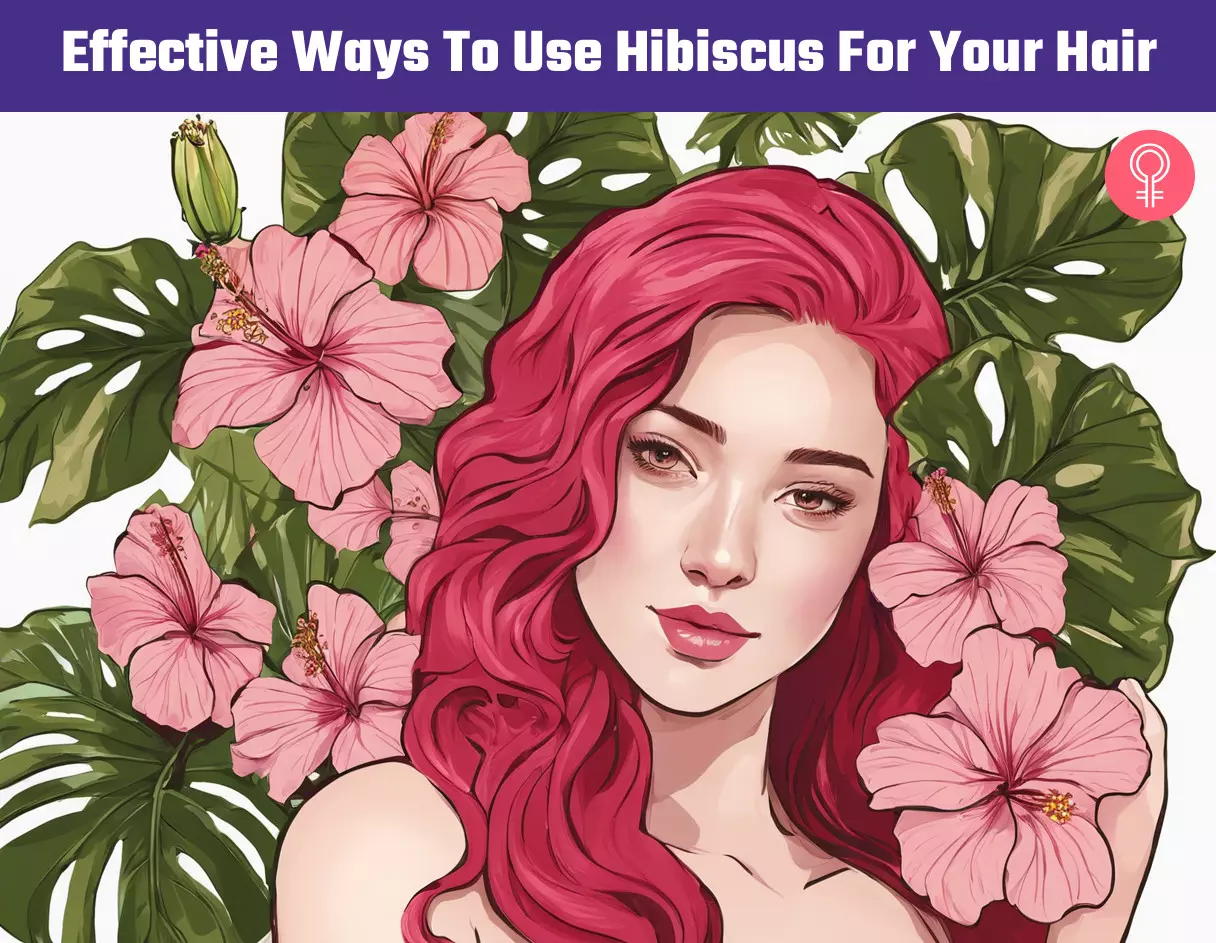
Image: Stable Diffusion/StyleCraze Design Team
Learn how to make a DIY Hibiscus Hair Mask for extreme hair growth! Get ready to promote healthy hair growth with this easy-to-follow hair mask tutorial. Check out the video below!
References
Articles on StyleCraze are backed by verified information from peer-reviewed and academic research papers, reputed organizations, research institutions, and medical associations to ensure accuracy and relevance. Read our editorial policy to learn more.
- In vivo and in vitro evaluation of hair growth potential of Hibiscus rosa-sinensis Linn
https://pubmed.ncbi.nlm.nih.gov/12963149/ - The Role of Vitamins and Minerals in Hair Loss: A Review
https://www.ncbi.nlm.nih.gov/pmc/articles/PMC6380979/ - Nutritional and amino acid contents of differently treated Roselle (Hibiscus sabdariffa L.) seeds
https://www.sciencedirect.com/science/article/abs/pii/S0308814608005268 - Chemical constituents, pharmacological effects and therapeutic importance of Hibiscus rosa-sinensis- A review
https://www.researchgate.net/publication/326972460_Chemical_constituents_pharmacological_effects_and_therapeutic_importance_of_Hibiscus_rosa-sinensis-_A_review - Biologically Active Compounds from the Genus Hibiscus.
https://www.tandfonline.com/doi/full/10.1080/13880200701575320 - Rosa sinensis (Hibiscus) -a versatile Indian origin plant
https://www.jchps.com/issues/Volume%208_Issue%204/jchps%208(4)%2070%20Diana%20Pearline.pdf - Effect of mineral oil, sunflower oil, and coconut oil on prevention of hair damage
https://pubmed.ncbi.nlm.nih.gov/12715094/ - Standardized Scalp Massage Results in Increased Hair Thickness by Inducing Stretching Forces to Dermal Papilla Cells in the Subcutaneous Tissue
https://www.ncbi.nlm.nih.gov/pmc/articles/PMC4740347/ - Fenugreek (Trigonella foenum-graecum L.) As a Valuable Medicinal Plant
https://www.ijabbr.com/article_7851_bbd8fa7701b237d7746306a9df24e736.pdf - Impact of Trigonella foenum-graecum Leaves Extract on Mice Hair Growth
https://www.researchgate.net/publication/318655670_Impact_of_Trigonella_foenum-graecum_Leaves_Extract_on_Mice_Hair_Growth - Lawsonia Inermis Linn: A Plant with Cosmetic and Medical Benefits
https://www.researchgate.net/publication/299545214_Lawsonia_Inermis_Linn_A_Plant_with_Cosmetic_and_Medical_Benefits - Emblica (Phyllanthus emblica Linn.) Fruit Extract Promotes Proliferation in Dermal Papilla Cells of Human Hair Follicle
https://scialert.net/fulltext/?doi=rjmp.2011.95.100 - Recent Trends in Potential Traditional Indian Herbs Emblica officinalis and Its Medicinal Importance
https://www.phytojournal.com/archives/2012/vol1issue1/PartA/2.pdf - Ethnopharmacological survey of home remedies used for treatment of hair and scalp and their methods of preparation in the West Bank-Palestine
https://www.ncbi.nlm.nih.gov/pmc/articles/PMC5499037/ - Investigation of hair growth promoting ability of herbal gel containing Zingiber officinale
https://www.semanticscholar.org/paper/Investigation-of-hair-growth-promoting-ability-of-R.V-BansodP./fcab117f4bed7925d28072c5ee01c21da1557a9c - The Golden Egg: Nutritional Value, Bioactivities, and Emerging Benefits for Human Health
https://www.ncbi.nlm.nih.gov/pmc/articles/PMC6470839/ - ANTIFUNGAL PROPERTIES OF NEEM (AZARDIRACHTA INDICA) LEAVES EXTRACT TO TREAT HAIR DANDRUFF
https://www.researchgate.net/publication/333671637_ANTIFUNGAL_PROPERTIES_OF_NEEM_AZARDIRACHTA_INDICA_LEAVES_EXTRACT_TO_TREAT_HAIR_DANDRUFF - Inhibition of type 1 and type 2 5alpha-reductase activity by free fatty acids, active ingredients of Permixon
https://pubmed.ncbi.nlm.nih.gov/12477490/ - Onion juice (Allium cepa L.), a new topical treatment for alopecia areata
https://pubmed.ncbi.nlm.nih.gov/12126069/ - Murraya koenigii (L.) Spreng: an ethnobotanical, phytochemical and pharmacological review
https://www.phytojournal.com/archives/2014/vol3issue3/PartB/31.1.pdf - Evaluation of antibacterial and antifungal activity of fenugreek (Trigonella foenum-graecum) extracts
https://www.researchgate.net/publication/299542917_Evaluation_of_antibacterial_and_antifungal_activity_of_fenugreek_Trigonella_foenum-graecum_extracts - ALOE VERA: A SHORT REVIEW
https://www.ncbi.nlm.nih.gov/pmc/articles/PMC2763764/ - Study of colouring effect of herbal hair formulations on graying hair
https://www.ncbi.nlm.nih.gov/pmc/articles/PMC4471652/
Read full bio of Tiffany Young
Read full bio of Arshiya Syeda
Read full bio of Ramona Sinha
Read full bio of Swathi E






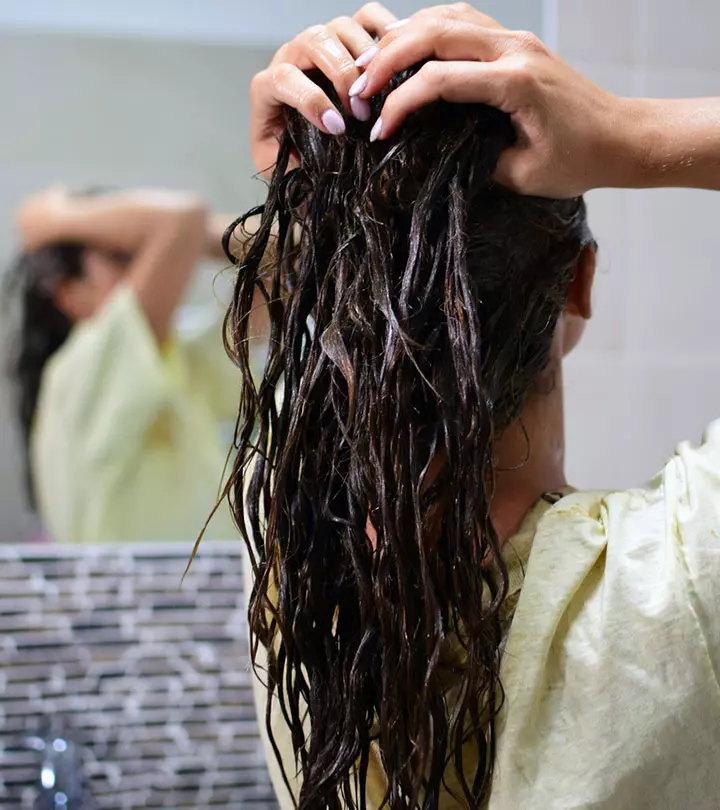
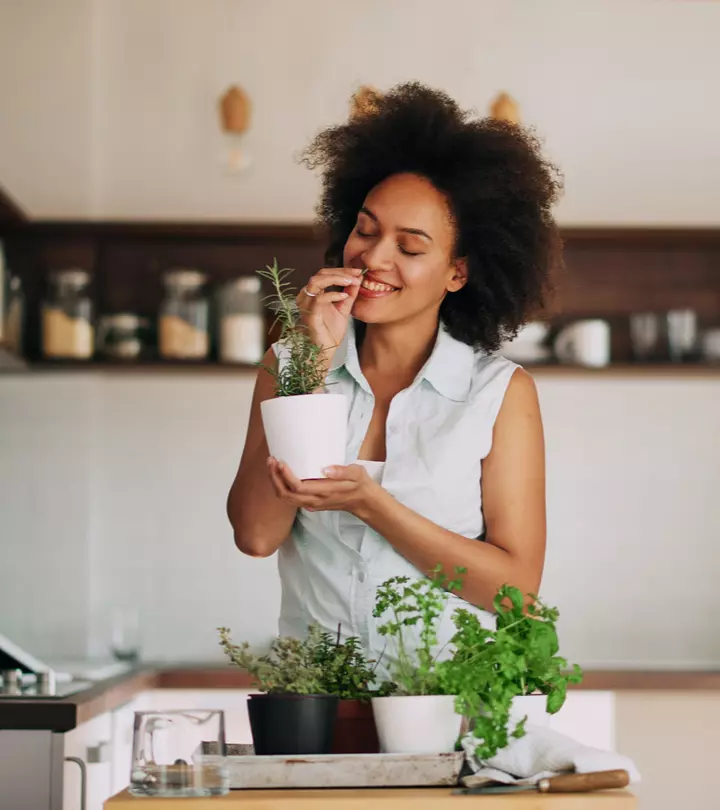
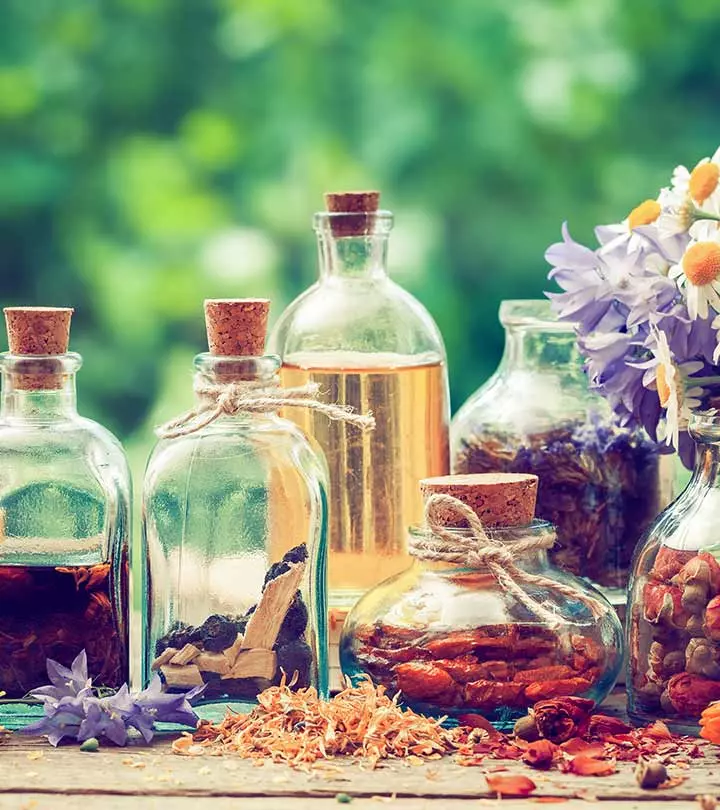
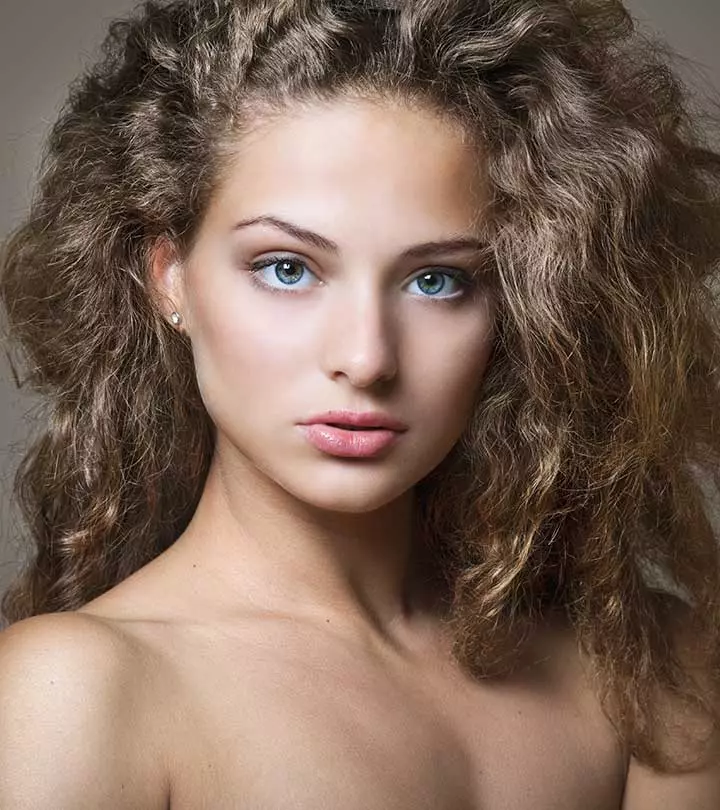

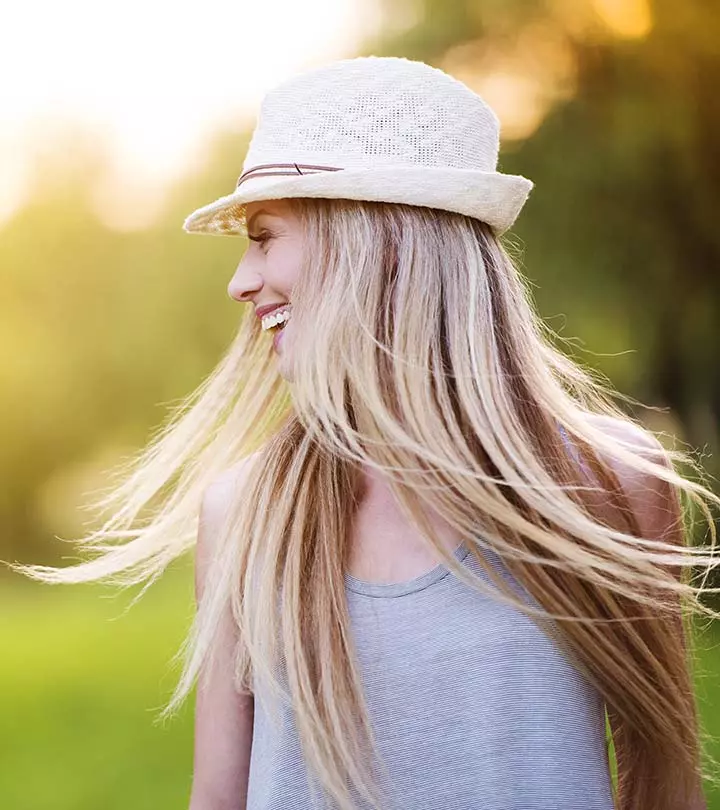
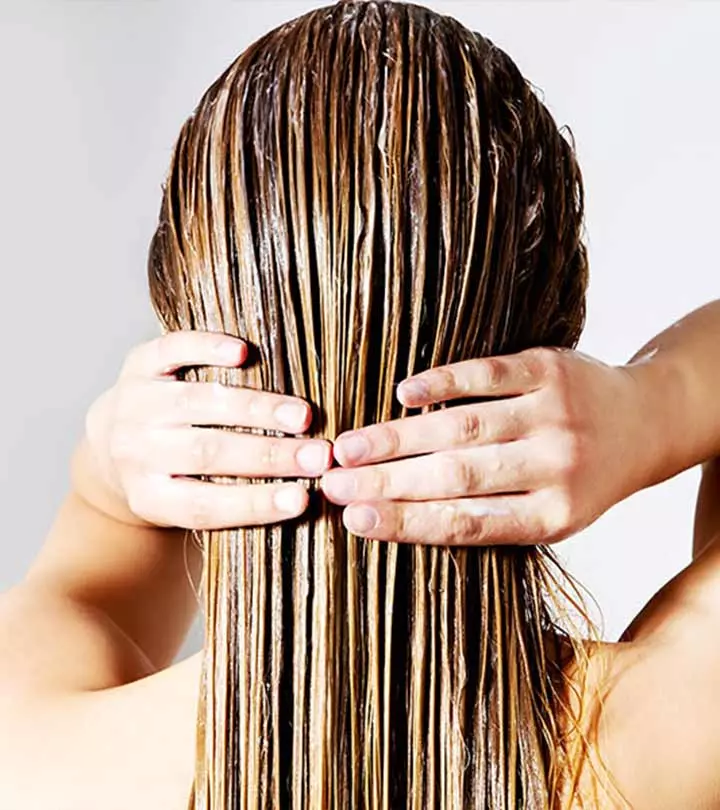
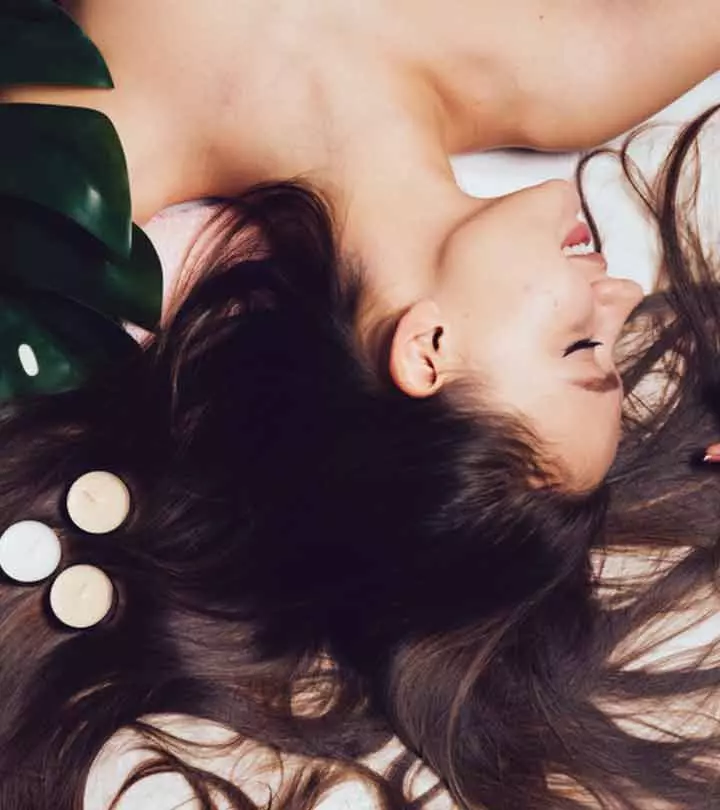
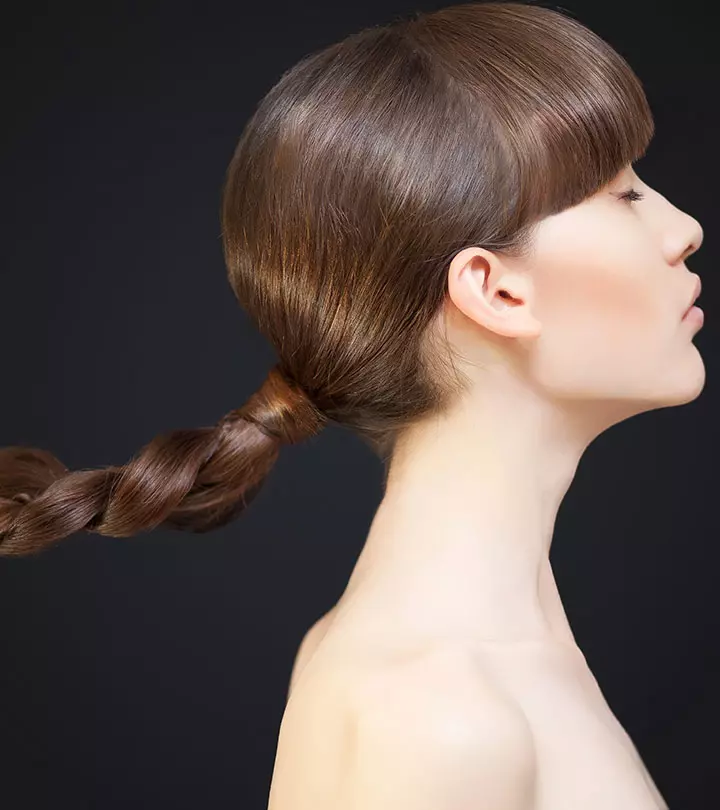
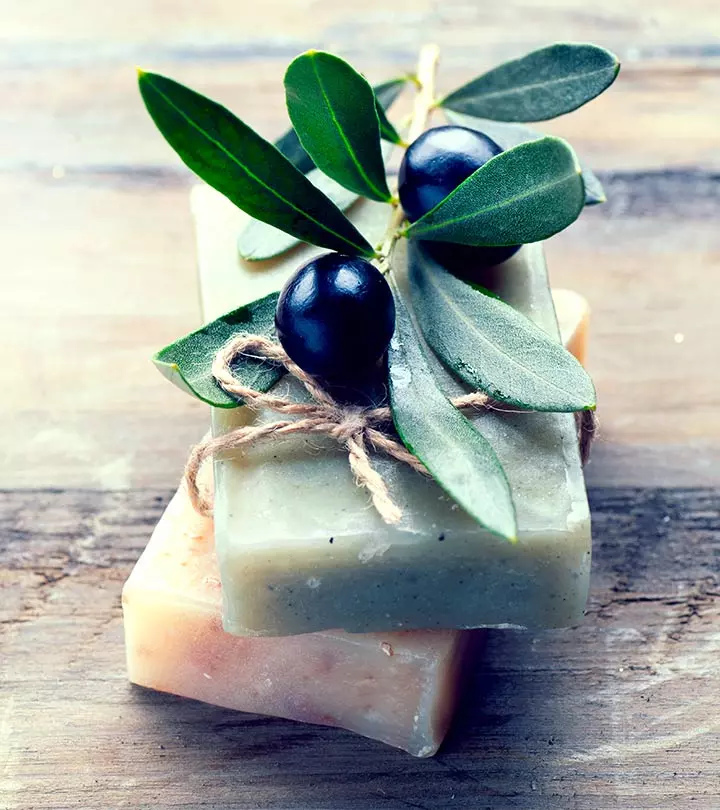
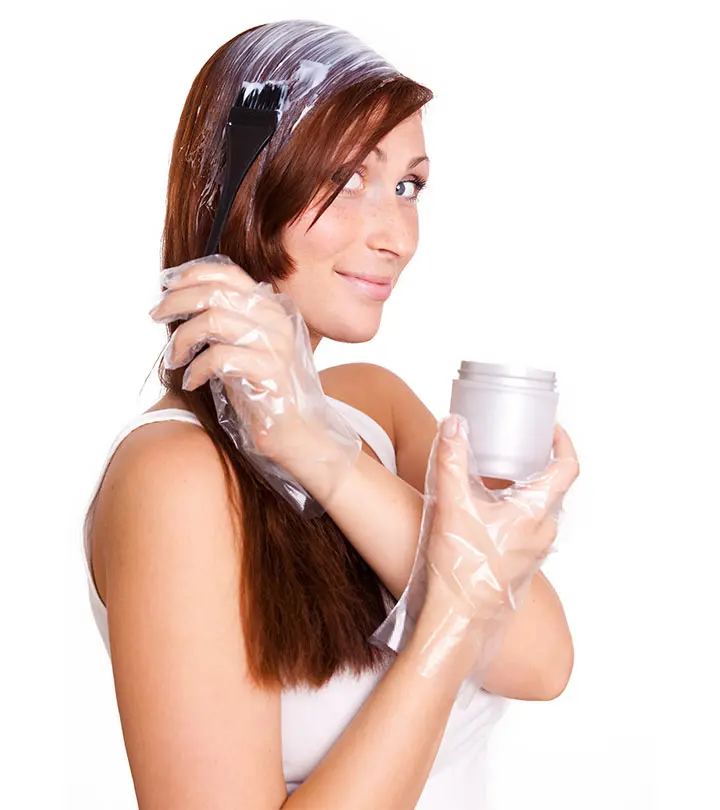
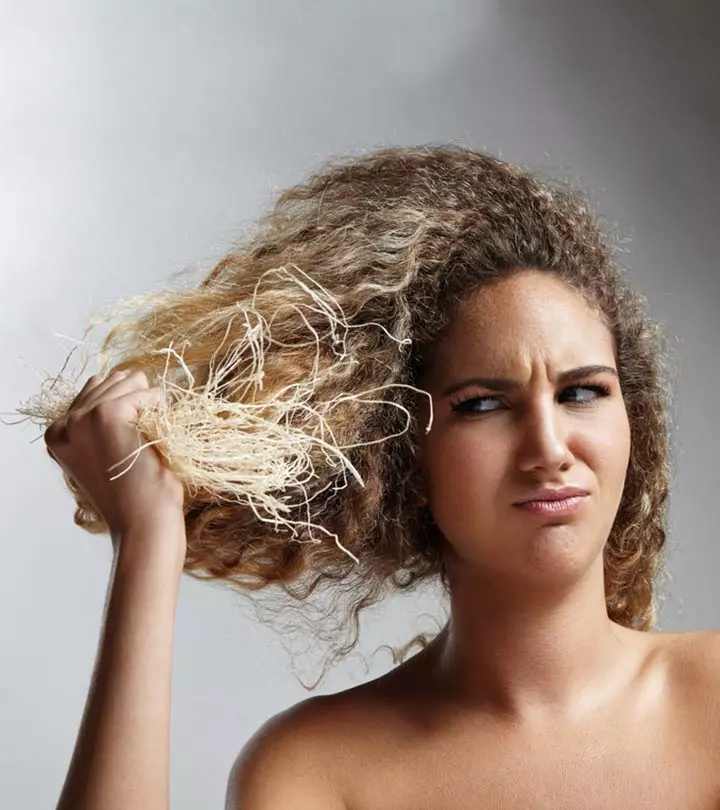

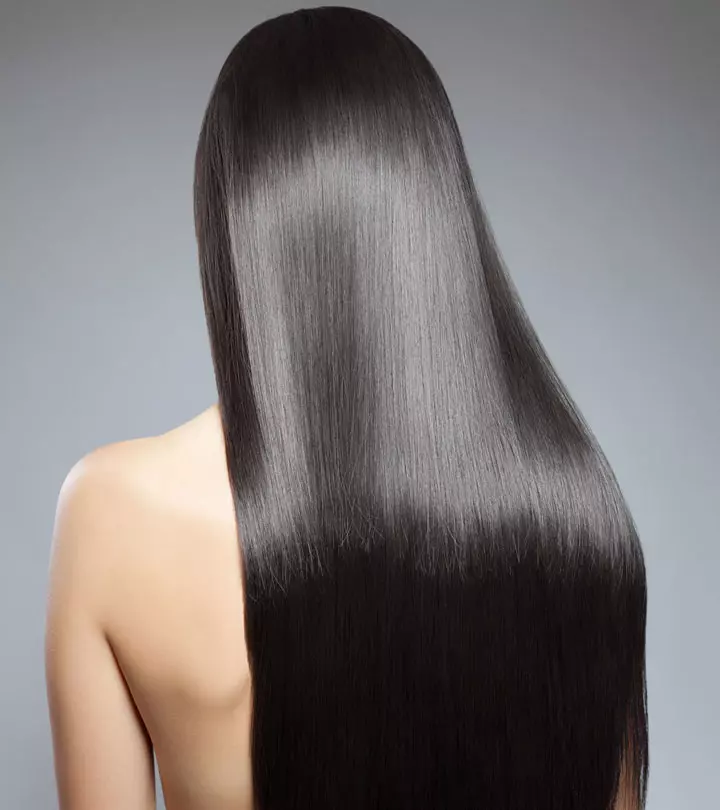
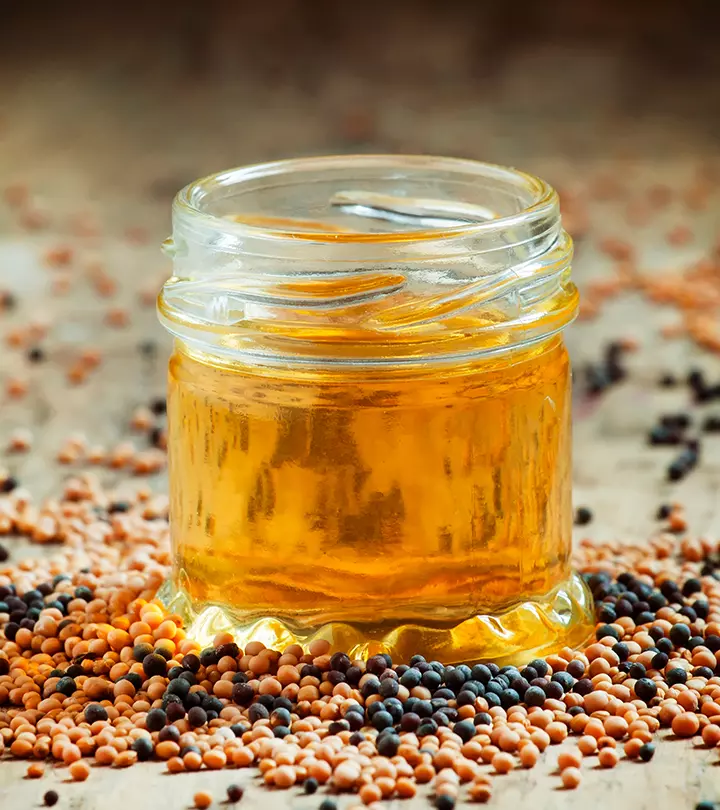

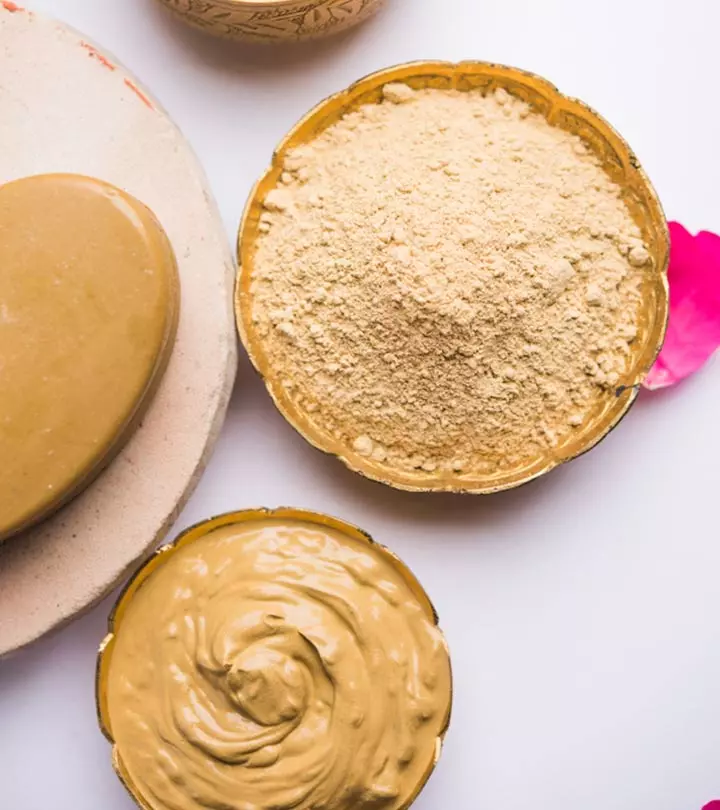
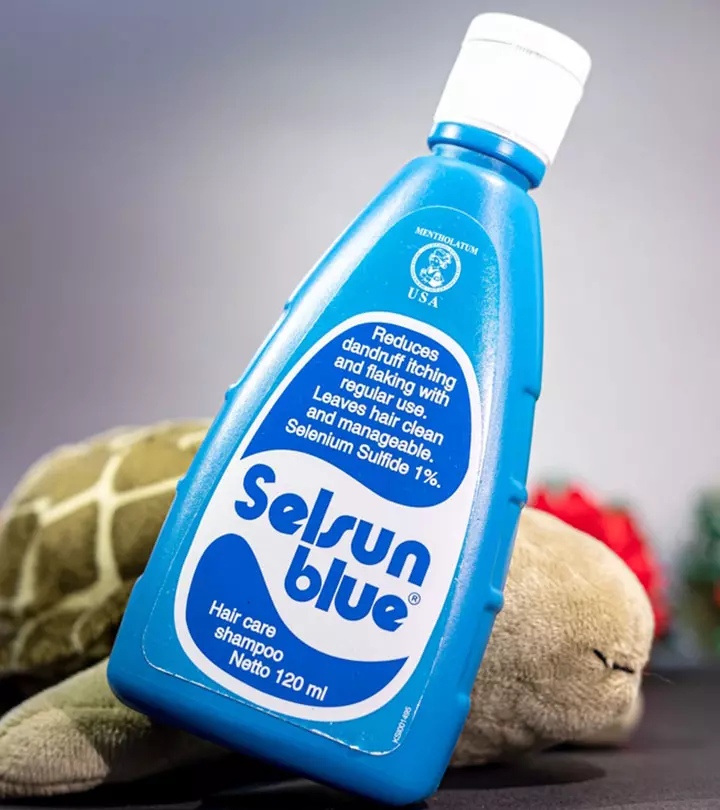
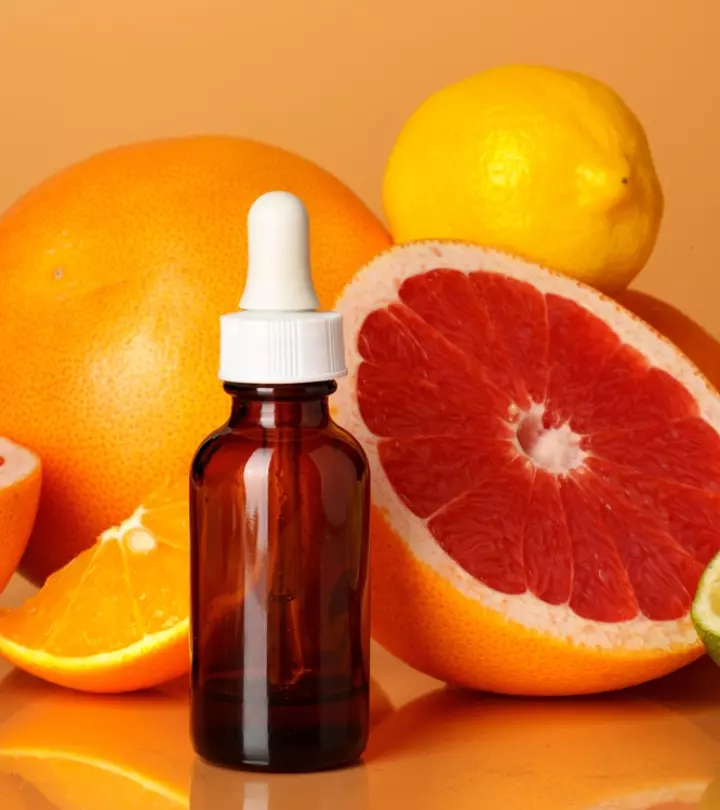
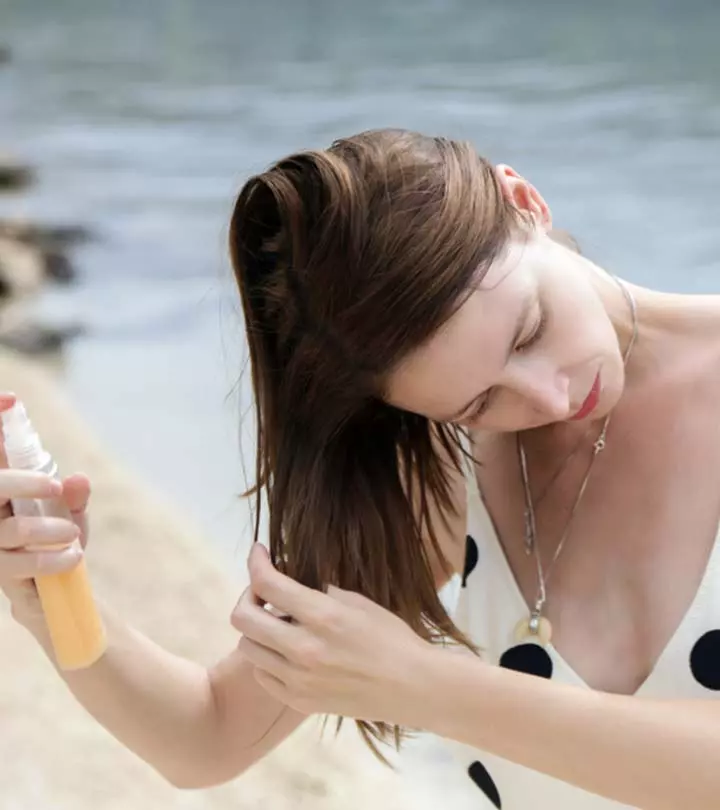

Community Experiences
Join the conversation and become a part of our empowering community! Share your stories, experiences, and insights to connect with other beauty, lifestyle, and health enthusiasts.